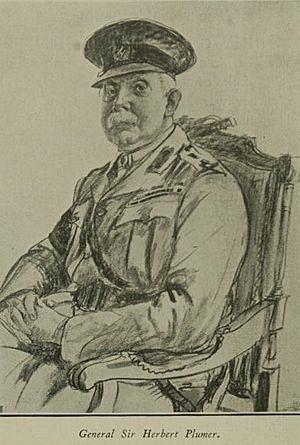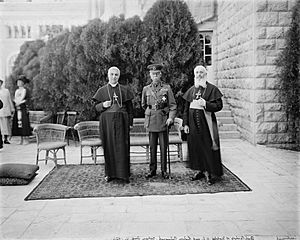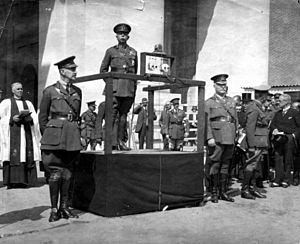Herbert Plumer, 1st Viscount Plumer facts for kids
Quick facts for kids
The Viscount Plumer
|
|
|---|---|
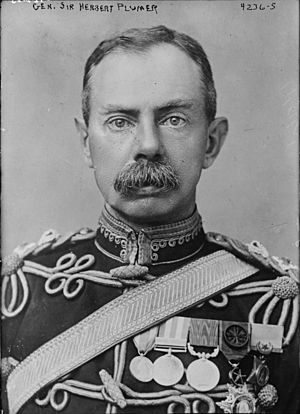
Portrait by Alexander Bassano, 1899
|
|
| Born | 13 March 1857 Kensington, London, England, United Kingdom |
| Died | 16 July 1932 (aged 75) Knightsbridge, London, England, United Kingdom |
| Buried | |
| Allegiance | United Kingdom |
| Service/ |
British Army |
| Years of service | 1876–1919 |
| Rank | Field Marshal |
| Unit | 65th (2nd Yorkshire, North Riding) Regiment of Foot York and Lancaster Regiment |
| Commands held | British Army of the Rhine Second Army Northern Command 5th Division 7th Division 10th Division 4th Brigade |
| Battles/wars | Mahdist War Second Matabele War Second Boer War First World War |
| Awards | Knight Grand Cross of the Order of the Bath Knight Grand Cross of the Order of St Michael and St George Knight Grand Cross of the Royal Victorian Order Knight Grand Cross of the Order of the British Empire Mentioned in Despatches |
| Other work | High Commissioner of Palestine |
Field Marshal Herbert Charles Onslow Plumer, 1st Viscount Plumer, GCB, GCMG, GCVO, GBE, KStJ (13 March 1857 – 16 July 1932) was a very important British Army officer during the First World War. He is known for leading the Second Army. In June 1917, he won a huge victory against the German Army at the Battle of Messines. This battle began with a series of massive explosions. These were caused by Royal Engineers' tunnelling companies who had placed 19 mines under German lines. This was described as the loudest explosion in human history. After the war, he served as the Commander-in-Chief of the British Army of the Rhine. He was also the Governor of Malta. Later, in 1925, he became the High Commissioner of the British Mandate for Palestine, retiring in 1928.
Contents
Early Military Career
Herbert Plumer was born in Kensington, London, in 1857. He went to Eton College and the Royal Military College, Sandhurst. These were important schools for young men who wanted to join the army.
He officially joined the army as a lieutenant in the 65th (2nd Yorkshire, North Riding) Regiment of Foot in 1876. He served with his regiment in India. In 1884, he went to the Sudan as part of the Nile Expedition. He fought in the Battle of El Teb and the battle of Tamai. His bravery was noted in official reports.
After attending the Staff College in England, he was promoted to major in 1893. He then served in Southern Rhodesia in 1896. There, he helped disarm the local police. Later that year, he led a force during the Second Matabele War.
The Boer War and Beyond
In 1899, Plumer returned to Southern Rhodesia. He put together a group of mounted soldiers. He led them during the Second Boer War. He helped relieve the Siege of Mafeking, a famous event where a town was surrounded by enemy forces.
He was promoted to colonel in 1900. He captured a wagon train belonging to a famous enemy general, Christiaan de Wet. When he returned to the United Kingdom in 1902, King Edward VII met him. Lord Kitchener, a top commander, praised Plumer for his excellent military skills.
Plumer continued to rise through the ranks. He became a major general in 1902. He commanded several different army divisions and districts. In 1908, he became a lieutenant general. By 1911, he was the Commander-in-Chief for Northern Command. He also helped with the London Boy Scouts for a few years.
First World War Heroics
When the First World War began in 1914, Plumer was sent to France in 1915. He was given command of V Corps. He led them at the Second Battle of Ypres in April 1915.
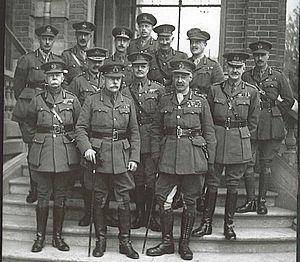
In May 1915, he took command of the Second Army. He was promoted to full general in June 1915. He achieved a huge victory at the Battle of Messines in June 1917. This battle started with a series of massive explosions. These were caused by Royal Engineers' tunnelling companies who had placed 19 mines under German lines. This was described as the loudest explosion in human history. After the mines exploded, Plumer's soldiers advanced a long distance, taking control of the area.
He won more victories later that year. These included the battle of the Menin Road Ridge and the battle of Polygon Wood in September 1917. He also won the battle of Broodseinde in October 1917. His forces advanced thousands of yards in these battles.
In November 1917, Plumer was sent to the Italian Front. He commanded the British Expeditionary Force there. He continued to command the Second Army during the final parts of the war. This included the German spring offensive and the Allied Hundred Days Offensive.
Life After the War
After the war, Plumer was appointed Commander-in-Chief of the British Army of the Rhine in December 1918. He became the Governor of Malta in May 1919. On July 31, 1919, he was promoted to field marshal. He was also given the title Baron Plumer for his great service.
In August 1925, he became the High Commissioner of the British Mandate for Palestine. This was a very important job. He had to deal with different groups of people, including Zionists (Jewish people who wanted a homeland) and Arab Nationalists. He tried to be fair to everyone. He famously said he would take responsibility for difficult situations. People saw him as "genuinely even handed." He was one of the few British leaders who was popular with both the Jewish and Arab communities there.
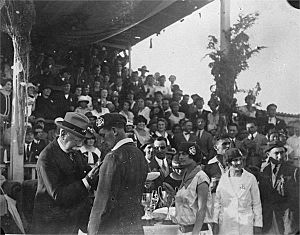
On July 24, 1927, he led the opening ceremony for the Menin Gate memorial in Ypres, Belgium. This memorial honors soldiers who died in the war.
For his long and important public service, he was given the title Viscount Plumer on June 3, 1929.
Death and Family
Herbert Plumer died at his home in Knightsbridge, London, on July 16, 1932. He was 75 years old. His body was buried in Westminster Abbey, a very famous church in London where many important people are laid to rest.
In July 1884, Plumer married Annie Constance Goss. They had three daughters and one son.
Honours and Awards
Plumer received many awards for his service. Some of the most important ones include:
- Knight Grand Cross of the Order of the Bath
- Knight Grand Cross of the Order of St Michael and St George
- Knight Grand Cross of the Royal Victorian Order
- Knight Grand Cross of the Order of the British Empire
He also received awards from other countries, such as:
- The Legion of Honour from France
- The Croix de Guerre from Belgium
- The Army Distinguished Service Medal from the United States
See also
- Menin Gate


